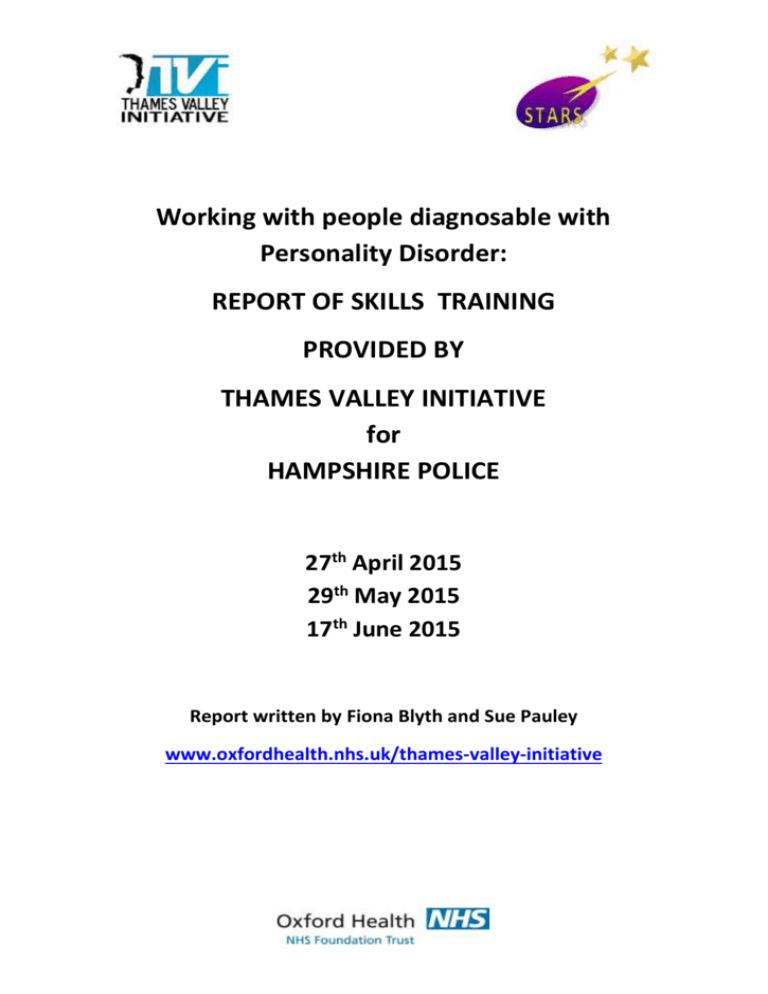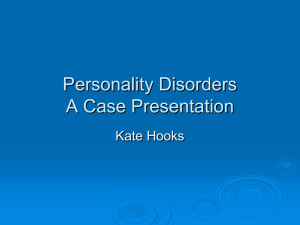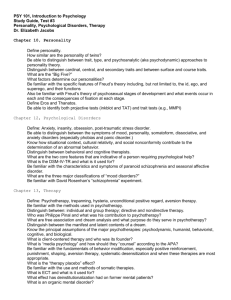This report - Oxford Health NHS Foundation Trust
advertisement

Working with people diagnosable with Personality Disorder: REPORT OF SKILLS TRAINING PROVIDED BY THAMES VALLEY INITIATIVE for HAMPSHIRE POLICE 27th April 2015 29th May 2015 17th June 2015 Report written by Fiona Blyth and Sue Pauley www.oxfordhealth.nhs.uk/thames-valley-initiative Project introduction This report relates to personality disorder awareness level training provided by the Thames Valley Initiative for staff with a wide variety of roles within the Hampshire Constabulary. Agencies engaging with people who have complex needs have long recognised their unique problems and are familiar with the difficulties providing an effective service for them. Professionals often feel ill equipped or isolated and burnout is a common consequence. Subsequent formation of negative attitudes towards people with personality disorder/complex needs can lead to an escalation of conflict, extreme behaviour and difficult encounters. The one day module was developed to meet the need for a brief skills and theory course relevant to all staff working with people with personality problems and disorders, as laid out in the NIMHE “Capabilities Framework – Breaking the Cycle of Rejection” document. The course provides a basic theoretical understanding of personality development and disorder however the main focus is to promote positive attitudes towards people with personality disorder and enable effective application of skills in the workplace. Aims and objectives To equip the workforce with knowledge and skills to engage effectively with clients who may have difficulties associated with complex needs/personality disorder. Students will be able to Recognise features of personality disorder Understand how personality develops Understand the factors that influence the development of personality disorder Be aware of the particular difficulty people with personality disorder have in regulating thoughts and feelings Recognise factors that may trigger adverse reactions Develop self- awareness and explore their own attitude towards people with personality disorder and how it may affect the outcome of encounters with people. Understand the importance of effective communication when managing boundaries in a range of situations Structure of course The module is structured as follows: Brief overview of the features of personality disorder Brief overview of personality development Explanation of the impact of personality disorder on an individuals’ capacity to process information and regulate feelings The impact of personality disorder on relationships and behaviour Experiential exercises to promote application of theory in practice Open discussions with STARS (ex-service users) to promote understanding of the lived experience of personality disorder Trainers Fiona Blyth trained as a Transactional Analysis psychotherapist. She worked in the NHS for many years, training first as a nurse, and later working in individual, group and therapeutic community settings as a Consultant Psychotherapist. She now practices independently as a trainer and supervisor. STARS are people who have had a diagnosis of personality disorder and who have successfully completed treatment in specialist services. They have a lived experience of personality disorder and are able to share their experiences of contact with a range of services and reflect on what was helpful and perhaps more importantly what was likely to make encounters more difficult. Uptake The course was delivered on three separate days of the week to enable a wide coverage of rank and allowing for as many part time workers as possible Monday 27th April 2015 27 attendees Friday 29th May 2015 27 attendees Wednesday 17th June 2015 27 attendees Total attendance 81 Demograph of participants 29 5 15 PCSO PC Sgt Insp PS Staff Others 17 6 15 PCSO PC Sgt Insp PS Staff Others Student experience Students were asked to complete a brief evaluation form at the end of each day highlighting 3 things they had learned and how the training would impact on their practice. Overall experience. Students were asked to rate the course overall with 1 being the lowest and 5 being the highest. A high level of satisfaction with the training is indicated by scores as below (please note that this section was not completed on all questionnaires): 5 40 4 27 3 1 2 1 1 0 ‘The entire content was very informative and useful’ ‘Good pacing. Right amount of information presented in an easy to understand way’ ‘Interacting with people who’ve ‘been there’. That made the session worthwhile.’ Evidence of learning The comments show that students are aware of the complexity of the diagnosis and how it may impact on an individual. ‘Honestly enjoyed it all. As a police negotiator and front line officer there were some ‘gems’ in there to further my knowledge and understanding of PD’ ‘Things learned today will greatly assist in further dealings with people who have PD or assist in identifying those who may have a PD’ ‘How personality disorder can affect people's interaction with positions of authority’ ‘Greater understanding of PD and role of police. How people with PD manage their condition with help from police and other agencies’ ‘I will bear in mind when dealing with potential PD sufferers - particularly younger persons - early identification and sign posting’ ‘ This course has given me a better understanding of PD and how to be more compassionate (without being sarcastic) ‘ Impact on attitude and practice In terms of developing understanding and impact of the course on their own attitude the opportunity to hear from people with a lived experience was cited as helping them to understand some of the behaviour they find challenging in clients. ‘Not to be so judgemental’ ‘Aid me in my day to day policing, understand individual needs for the best outcome’ ‘Make people aware of the procedures and keep them up to date and be honest about what might happen and what can be expected’ ‘Approach people in different ways, consider PD as a potential cause of incident / offence’ ‘Confidence to know active listening in crucial and use daily despite time pressure’ ‘To have a more balanced approach and understand that often I will not be able to meet PD sufferers expectations’ ‘A change in approach / style when dealing with potential PD members of the public’ ‘Be aware of my behaviour and how that impacts on the person’ ‘Tone of voice is important’ ‘To acknowledge the person may be in crisis and it's not personal’ ‘Remembering how my behaviour can affect others - I may have been to many situations but the person I am dealing with is an individual. Looking at bigger picture than what I am presented with’ ‘Accept we can get it wrong. Treat everyone with dignity. Understand that something traumatic has happened for them to have a PD’ Summary The course was attended by staff from a broad range of age, experience, roles and academic history. This worked well and provided a rich environment for the development of a shared perspective across the service. The students were encouraged to take what they had learned and share it with colleagues. Cascading learning is useful but to sustain change in practice and attitude in the longer term it will be important to ensure enough people are trained to become a critical mass who inform others and model effective engagement. The staff who attended were highly motivated and involved throughout which made the training very satisfying. I formed the impression of a group of people ready to promote a shift in attitude and practice with a view to reducing crisis and conflict when working with people with personality disorders. I think this shift in attitude will also have a positive impact on all dealings with people generally.








